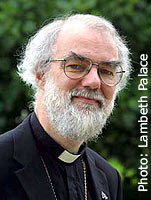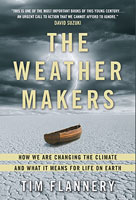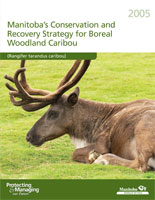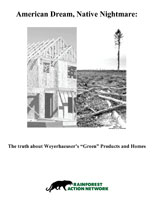
News |
- Asia-Pacific Partnership No Alternative to Kyoto
- Wuskwatim Agreement Announced - June Vote
- Manitoba's Poor Protected Areas Performance Exposed
- Climate Change Film Offers Warning, Hope
- Canada's 2006 Budget Highlights
- Archbishop of Canterbury on Climate Change
- Farewell Jane Jacobs
- Opposition to Winnipeg Hog Plant Gains Momentum
- Reading for Global Citizens: The Weather Makers
- Long-Awaited Woodland Caribou Strategy
- Greening America's Elite?
- Grassy Narrows & Shareholders Battle Weyerhaeuser
| Asia-Pacific Partnership No Alternative to Kyoto | 12 May 06 |
 WWF Canada is warning the Asia-Pacific Partnership on Clean Development and Climate (known as AP6) will not produce results on climate change and is not an alternative to meeting Canada's greenhouse gas reduction commitments under the Kyoto Protocol. WWF Canada is warning the Asia-Pacific Partnership on Clean Development and Climate (known as AP6) will not produce results on climate change and is not an alternative to meeting Canada's greenhouse gas reduction commitments under the Kyoto Protocol.WWF Canada charged that allusions by Environment Minister Rona Ambrose indicating that Canada is considering joining the AP6 Partnership show the federal Government is willing to accept runaway climate change. "The key principles of the Asia Partnership are very much in line with where our government wants to go," Ambrose said at an April 25, 2006 briefing. "The Asia Pacific Partnership is something we're looking at." "Turning our backs on our Kyoto targets and musing about joining a breakaway, trade-focused pact discredits Canada's reputation and authority, and does absolutely nothing to actually fight dangerous climate change," says Julia Langer, Director of WWF-Canada's Global Threats Programme. WWF is urging the United States and Australia to join the 148 countries, including developing countries such as China that are working on effective emissions reductions under the Kyoto Protocol. View the May 9, 2006 Greenwire article View the April 26, 2006 WWF Canada press release View the April 25, 2006 Canadian Press article in the Ottawa Citizen View the April 25, 2006 Global National (Television) story Sources: WWF Canada, Canadian Press |
|
| Wuskwatim Agreement Announced - June Vote | 11 May 06 |
 Nisichawayasihk Cree Nation (NCN) and Manitoba Hydro announced their completed negotiations for the Wuskwatim Project Development Agreement (PDA) late march 2006. Negotiations for the Wuskwatim PDA began in 1997 and are based on the Northern Flood Agreement (NFA) for NCN and the associated NCN NFA implementation agreement of 1996. Nisichawayasihk Cree Nation (NCN) and Manitoba Hydro announced their completed negotiations for the Wuskwatim Project Development Agreement (PDA) late march 2006. Negotiations for the Wuskwatim PDA began in 1997 and are based on the Northern Flood Agreement (NFA) for NCN and the associated NCN NFA implementation agreement of 1996.The PDA is subject to a June 14th, ratification vote by NCN members who live both on and off the reserve. The ratification vote requires a double majority. That is a majority (at least 51%) of eligible NCN members must vote and a majority (at least 51%) of those voting must approve the PDA. Manitoba Hydro, NCN, and the Manitoba government have said that community ratification is needed or the Wuskwatim generation station will not be built. This agreement and the ratification vote do not include the three segments of transmission lines that are part of the whole project. The PDA (1,500 pages) is not available on the NCN or Manitoba Hydro web sites, and has also not otherwise been made available electronically (e.g. on CD-ROM). This is hindering efforts to conduct independent legal or economic reviews. The provincial government would have to approve certain transactions described in the PDA. As well, the provincial and federal governments have yet to make their decisions about whether to issue environmental licenses, various permits, and water licenses. The PDA and more than a dozen related agreements define and govern ownership, financing, construction, operation, management and other environmental aspects of the Wuskwatim Generation Project. View the April 28, 2006 Nisichawayasihk Cree Nation (NCN) press release View the March 27, 2006 Transcript of PDA announcement speeches (DOC) View three March 2006 NCN press releases: news release, consultation, facts View the March 30, 2006 Manitoba Hydro press release View NCN information about the Wuskwatim Project Development Agreement View Wuskwatim Projects information on Manitoba Wildlands View Wuskwatim environmental review and hearings documents Visit Manitoba Hydro's web site for the Wuskwatim Projects Sources: Nisichawayasihk Cree Nation, Manitoba Hydro |
|
| Manitoba's Poor Protected Areas Performance Exposed | 09 May 06 |
 The Sierra Club of Canada unveiled its new and improved National Forest Strategy database, which this year includes grades and a best practices layer. The database, which was released May 4th, provides a revealing picture of forestry practices in Manitoba. The Sierra Club of Canada unveiled its new and improved National Forest Strategy database, which this year includes grades and a best practices layer. The database, which was released May 4th, provides a revealing picture of forestry practices in Manitoba.One of the most notable sections in which Manitoba fared poorly was in the Completion of a Network of Protected Areas theme. The report card identifies that there has been no increase in representation of landscapes or natural regions in Manitoba since 1999, and that the Manitoba government Action Plan for a Network of Protected Areas expired in early 2003 and has not been updated, despite commitments from the Minister of Conservation to do so. As industrial resource extraction activities in forested ecosystems are failing to adequately protect habitat for wildlife species such as woodland caribou, the need for protected forest areas is paramount. The database and report card evaluates the progress of provincial commitments under the National Forest Strategy (NFS), a national road map for more ecologically and socially sustainable forest management. The NFS was developed by a process that included industry, small woodlot owners, academics, Aboriginal communities, environmental organizations and government. The database now also includes a best practices layer that highlights progressive industrial and small scale forest management initiatives across the country, as well as provincial/territorial progressive forest management policies. "Manitoba's government has an immediate opportunity to improve its standing under the National Forest Strategy, which it signed. The ministers responsible need to act this spring on requests for protected areas status from First Nations involved in the east side World Heritage Site nomination, which our government also supports," concluded Gaile Whelan Enns, Director, Manitoba Wildlands. View the May 4, 2006 Sierra Club of Canada national press release View the May 4, 2006 Sierra Club of Canada Manitoba press release (DOC) View the Sierra Club of Canada National Forest Strategy Database Source: Sierra Club of Canada |
|
| Climate Change Film Offers Warning, Hope | 09 May 06 |
 Former US Vice-President Al Gore's message to a Toronto audience May 4th was, "Global warming is real. We human beings are mainly responsible for it. The results are catastrophic - or will be unless we take action to stop it. We need to face it and we need to start right away. And, number five, it is not too late." Former US Vice-President Al Gore's message to a Toronto audience May 4th was, "Global warming is real. We human beings are mainly responsible for it. The results are catastrophic - or will be unless we take action to stop it. We need to face it and we need to start right away. And, number five, it is not too late." Gore was in Toronto to present the Canadian premiere of his new documentary film, An Inconvenient Truth. The documentary warns that mankind has about 10 years to act on the impact of greenhouse gases or else the planet faces an environmental catastrophe. An Inconvenient Truth is designed to make a difference in the debate. Sierra Club of Canada Executive Director Elizabeth May was at the Toronto premieres and praised Gore's film "An Inconvenient Truth is unlike any other film I have seen. It is entertaining, hopeful and profoundly moving. It is both a very personal story and a hard core science briefing. It is often very funny." Gore notes that Canada has a huge role to play on the issue of climate change, and he expressed concern that Canada may be trying to evade its responsibility and its commitment to the Kyoto Protocol. "They (Canada's new federal government) were elected because of issues that had nothing to do with global warming and the climate crisis, and now they're pretending to have a mandate to abandon Canada's historic commitment to playing a leadership role in cleaning up the world's environment." An Inconvenient Truth opens in Winnipeg mid June. For information on tickets, contact info@manitobawildlands.org. Visit the web site for An Inconvenient Truth View the May 6, 2006 Canadian Press article on CTV View the May 5, 2006 Canadian Press article on CNEWS View the May 5, 2006 Toronto Sun article View the April 17, 2006 Climate Ark blog on An Inconvenient Truth Sources: Canadian Press, Toronto Sun, Climate Ark |
|
| Canada's 2006 Budget Highlights | 05 May 06 |
 Diverse groups - business, scientists, and faith groups, are urging Canada's new government to stay the course on Kyoto and climate change. The Kyoto Protocol was not mentioned in Canada's new federal May 2, 2006 budget. Environmental groups were disappointed and critical. Diverse groups - business, scientists, and faith groups, are urging Canada's new government to stay the course on Kyoto and climate change. The Kyoto Protocol was not mentioned in Canada's new federal May 2, 2006 budget. Environmental groups were disappointed and critical. The budget did indicate that $2 billion would be allocated over five years for a new climate change program. The previous Liberal government had allocated $4 billion over five years to curb greenhouse gas emissions. "Prime Minister Harper has dismantled the only climate change plan our country had and replaced it with subsidized transit passes that will do little to fight air pollution or convince people to leave their cars at home," said Dale Marshall, David Suzuki Foundation's Ottawa-based policy analyst. This budget raises concerns for Manitobans because of what is missing. Funding for Lake Winnipeg clean-up is not included. Other high profile Manitoba projects such as the Floodway expansion, and hydro projects are not mentioned. Bright spots in the 2006 Federal Budget include: elimination of the capital gains tax for donations made under the Ecological Gifts Program, and funding for public transit infrastructure. View the Green Budget Coalition response to federal budget View the May 5, 2006 Canadian Press article in the Chronicle Herald View the May 3, 2006 Canadian Press article on CNews View the May 2, 2006 CBC News article View the May 2, 2006 David Suzuki Foundation press release View the Green Budget Coalition Recommendations for Budget 2006 Visit the Canadian Government 2006 Budget website Sources: Canadian Press, David Suzuki Foundation, CBC News |
|
| Archbishop of Canterbury on Climate Change | 04 May 06 |
 Dr. Rowan Williams, Archbishop of Canterbury, says that ignoring climate change is un-Christian. "I don't think it's compatible with a Christian ethic to ignore the environmental degradation that we face (with respect to climate change)." Dr. Rowan Williams, Archbishop of Canterbury, says that ignoring climate change is un-Christian. "I don't think it's compatible with a Christian ethic to ignore the environmental degradation that we face (with respect to climate change)."The Archbishop spoke with the BBC Radio 4's Today program and outlined climate change as a moral issue, where "the moral responsibility lies with absolutely everybody, not only in terms of examining our own lifestyle and asking what concretely can be done, but also in sending a message to governments that this is recognized as a priority by the public." Dr. Williams appears to take climate change very seriously and recognized the potential for catastrophic global effects and the need for binding international commitments for greenhouse gas reductions. "Nobody... likes talking about enforceable international protocols and yet unless there is a real change in attitude, we have to contemplate those very unwelcome possibilities, if we want to the global economy not to collapse and millions, billions of people to die." View the March 30, 2006 Episcopal News Service article and interview Source: Episcopal News Service |
|
| Farewell Jane Jacobs | 04 May 06 |
 Toronto-based urban critic, author, ecological thinker and activist Jane Jacobs died April 25, 2006, a week shy of her 90th birthday. She was born May 4, 1916, in Scranton, Penn., but Canada had been her home since the late 1960s. Her powerful critiques about the urban renewal policies of North American cities have influenced thinking about urban planning for two generations. Toronto-based urban critic, author, ecological thinker and activist Jane Jacobs died April 25, 2006, a week shy of her 90th birthday. She was born May 4, 1916, in Scranton, Penn., but Canada had been her home since the late 1960s. Her powerful critiques about the urban renewal policies of North American cities have influenced thinking about urban planning for two generations. Jacobs tapped out seven books on a manual typewriter, and was working on two manuscripts at her death. Her last book, Dark Age Ahead was a wake-up call on the dangers facing mankind. She also authored The Death and Life of Great American Cities, The Economy of Cities, Cities and the Wealth of Nations and Systems of Survival: A Dialogue on the Moral Foundations of Commerce and Politics. In her writing and activism, Jane Jacobs questioned the sprawling suburbs that characterized urban planning, saying it was killing inner cities and discouraging the economic vitality that springs organically from neighbourhoods. In her last public act, she sent off a letter of support dated April 17th to West Vancouver residents battling expansion of the sea to sky highway through an environmentally sensitive region. "I wish to convey my support and admiration to people of West Vancouver who are sacrificing their time, energy and possibly even their freedom to preserve and protect the magnificent and irreplaceable Eagleridge Bluffs and Larson Creek wetlands from this destructive, ill-conceived scheme." Jane Jacobs will be missed. Her thinking and her books will effect generations to come. View the April 25, 2006 CBC Online article View the April 26, 2006 Toronto Star article View the April 27, 2006 Winnipeg Free Press article (DOC) Sources: CBC Online, Toronto Star |
|
| Opposition to Winnipeg Hog Plant Gains Momentum | 01 May 06 |
 A business group, a Concerned Citizens Alliance, and a coalition of family farm advocates, animal welfare experts and environmentalists have captured local media attention, held open houses, and spurred a second Winnipeg city council vote on the proposed OlyWest hog plant project. All are opposed to hog plant, planned for the St. Boniface Industrial Park in Winnipeg. A business group, a Concerned Citizens Alliance, and a coalition of family farm advocates, animal welfare experts and environmentalists have captured local media attention, held open houses, and spurred a second Winnipeg city council vote on the proposed OlyWest hog plant project. All are opposed to hog plant, planned for the St. Boniface Industrial Park in Winnipeg.The OlyOpp group is businesses in the area who fear loss of business over potential environmental contamination. They have vowed to back anti-pig candidates in the next civic election - scheduled for fall 2006 - to prevent the hog processing and rendering facility from setting up shop. Manitoba Eco-Network, National Farmers Union, and the Winnipeg Humane Society organized an April 20th open house to discuss the project and implications of an increase in intensive livestock operations that could result from the OlyWest plant. The OlyWest project is a proposed by three of the biggest pork processors and producers in Canada. The 300,000-square-foot OlyWest plant would process 2.25 million hogs per year and need about 1,100 workers. Both the City of Winnipeg and the Provincial Government are backing the project with financial incentives. The Manitoba Clean Environment Commission hearings into the proposed plant won't begin until well into 2007. This may mean that the hearings will coincide with a provincial election expected spring, 2007. View March & April 2006 coverage of the OlyWest hog plant from Manitoba media (DOC) Visit the OlyWest Proposal Envrionmental Assessment website for upcoming public meetings Visit Stop the Stink Sources: Winnipeg Free Press, Farmers Independent Weekly, Brandon Sun |
|
| Reading for Global Citizens: The Weather Makers | 01 May 06 |
 The Weather Makers, written by Tim Flannery, and Australian paleontolgist and writer-scientist, is being published around the world, with Canada's Harper Collins edition, and launches going on across Canada this spring. The book provides a complete account, including implication of a global change that is damaging life on earth and threatening our survivial - climate change. Including former concerns about air quality, and pollution Flannery moves to our challenge - the rapidly and irrevocably degraded atmosphere we all depend on, The Weather Makers has met with international acclaim, endorsed by scientists, prime ministers, and environmentalists. The Weather Makers, written by Tim Flannery, and Australian paleontolgist and writer-scientist, is being published around the world, with Canada's Harper Collins edition, and launches going on across Canada this spring. The book provides a complete account, including implication of a global change that is damaging life on earth and threatening our survivial - climate change. Including former concerns about air quality, and pollution Flannery moves to our challenge - the rapidly and irrevocably degraded atmosphere we all depend on, The Weather Makers has met with international acclaim, endorsed by scientists, prime ministers, and environmentalists.The Weather Makers may be critical to awakening readers to the seriousness of global climate change and mobilizing the public to pressure our politicians to take action. Andrew Nikiforuk writes in his Globe & Mail review of The Weather Makers, "Although the subject of climate change rarely rains on Canadian politics, Flannery's highly critical analysis of the globe's wacky carbon dictatorship might help change all that. This authoritative and maddeningly important book will fuel dinner arguments, spark school debates and rudely challenge the self-satisfied truffle-eaters and climate deniers among Calgary's oil elite. In Australia, its publication created such a stir that Environment Minister Ian Campbell did an about-face and declared that climate change 'represented a serious threat to Australia'." Flannery's book goes beyond doom and gloom and outlines actions that can and need to be taken to avoid disturbing and devastating effects predicted to come as a result of 'business as usual'. Even better is the assertion that action on climate change is not synonymous with economic ruin; in fact as economists and business leaders contend, shifting the global economy will create jobs and stimulate economic activity. View the March 4, 2006 Globe & Mail review of The Weather Makers (DOC) Visit the The Weather Makers website Source: Globe and Mail |
|
| Long-Awaited Woodland Caribou Strategy | 25 April 06 |
 Manitoba Conservation Minister Stan Struthers released its long-awaited updated woodland caribou strategy April 13, 2006. The 20-page document, Manitoba's Conservation and Recovery Strategy for the Boreal Woodland Caribou, has been in the works for a few years and is an update to the previous 2000 Woodland caribou strategy. The Manitoba government press release says the Province will be developing and implementing action plans based on the new woodland caribou strategy. Manitoba Conservation Minister Stan Struthers released its long-awaited updated woodland caribou strategy April 13, 2006. The 20-page document, Manitoba's Conservation and Recovery Strategy for the Boreal Woodland Caribou, has been in the works for a few years and is an update to the previous 2000 Woodland caribou strategy. The Manitoba government press release says the Province will be developing and implementing action plans based on the new woodland caribou strategy.The western Canadian population of boreal woodland caribou was declared a vulnerable species by the Committee on the Status of Endangered Wildlife in Canada (COSEWIC) April 1984. In May 2002, the status for the species in Canada, excluding coastal populations, was reassessed as threatened. In 2003, boreal woodland caribou were listed as threatened under the new national Species at Risk Act. All assessments of woodland caribou acknowledge that habitat loss, degradation and fragmentation are major threats to the species. Woodland caribou are still not included on the list of species at risk under Manitoba's Endangered Species Act, which requires that special measure be taken to protect species at risk and their habitat. This new strategy has omitted woodland caribou range areas on the east side of Manitoba, and down graded threat to the others. View the 2005 document: Manitoba's Conservation and Recovery Strategy for the Boreal Woodland Caribou (PDF) View the April 13, 2006 Manitoba Government press release View the Manitoba Conservation Fact Sheet on Boreal Woodlands Caribou View the 2000 Manitoba Conservation document: Woodland Caribou Strategy for Manitoba Sources: Manitoba Conservation, Manitoba Wildlands |
|
| Greening America's Elite? | 25 April 06 |
 Vanity Fair, the self-confessed bible for America's high rollers, has embraced the green cause; its May 2006 special issue cuts through the hand-wringing, denial and confusion about climate change with an in-depth look at the challenge ahead, a 30-page portfolio of a passionately, pro-environment generation. Vanity Fair, the self-confessed bible for America's high rollers, has embraced the green cause; its May 2006 special issue cuts through the hand-wringing, denial and confusion about climate change with an in-depth look at the challenge ahead, a 30-page portfolio of a passionately, pro-environment generation.Inside the pages, high profile Americans - from Julia Roberts to Robert Kennedy Jr., George Clooney to Bette Midler - are sending a message to their President and those still in eco-denial. "Time to get real," the magazine tells its 1 million readers. "Global warming is the problem, the biggest problem. It's not a matter of when any longer. It's here. Green is the future - the only future." Former US vice-president Al Gore grabs the most space with his essay on global warming. The first part is a summary of the science and warning signs if no action is taken to curb greenhouse gas emissions. The second part of the essay delves into the possibilities and opportunities that exist for positive environmental and economic change. "This crisis is bringing us an opportunity to experience what few generations in history ever have the privilege of knowing: a generational mission; the exhilaration of a compelling moral purpose; a shared and unifying cause; the opportunity to rise. When we rise, we will experience an epiphany as we discover that this crisis is not really about politics at all. It is a moral and spiritual challenge." View the April 16, 2006 Climate Ark article View Al Gore's article in the May 2006 issue of Vanity Fair View May 2006 issue of Vanity Fair on-line content View the May 2006 issue of Wired, article on Al Gore Sources: Climate Ark, Al Gore 2006 |
|
| Grassy Narrows & Shareholders Battle Weyerhaeuser | 25 April 06 |
 Bonnie Swain of Grassy Narrows First Nation took a message from her people to Weyerhaeuser at their annual shareholders meeting April 20, 2006. She spoke for three minutes and read a powerful and eloquent letter that her sister and fellow mother Chrissy Swain wrote. Bonnie Swain of Grassy Narrows First Nation took a message from her people to Weyerhaeuser at their annual shareholders meeting April 20, 2006. She spoke for three minutes and read a powerful and eloquent letter that her sister and fellow mother Chrissy Swain wrote. Grassy Narrows First Nation, members have been blockading an Ontario logging road for three years. They have been joined by Rainforest Action Network (RAN) to ramp their campaign to force Weyerhaeuser to stop buying wood from the company that logs the Grassy Narrows traditional lands. At the Weyerhaeuser shareholder meeting, RAN members nominated Swain to the board. Grassy Narrows sent a letter to Weyerhaeuser February 2006 demanding the company "Terminate all logging, buying, selling, investing, financing, and profiting from the desecration of our homeland by Weyerhaeuser and Abitibi corporations and their subsidiaries. No development will occur on our territory without the full, free, prior, and informed consent of our community." As part of the campaign, RAN recently released the report American Dream, Native Nightmare: The Truth About Weyerhaeuser's "Green" Products and Homes to educate Weyerhaeuser customers and shareholders about the company's destructive practices. Visit the Rainforest Action Network and Take Action for Grassy Narrows First Nation Visit Free Grassy Narrows web site View the April 19, 2006 News Tribune article View the RAN report: American Dream, Native Nightmare: The Truth About Weyerhaeuser's "Green" Products and Homes (PDF) Sources: Rainforest Action Network, FreeGrassy.org, News Tribune |
|


 RSS Feeds:
RSS Feeds: